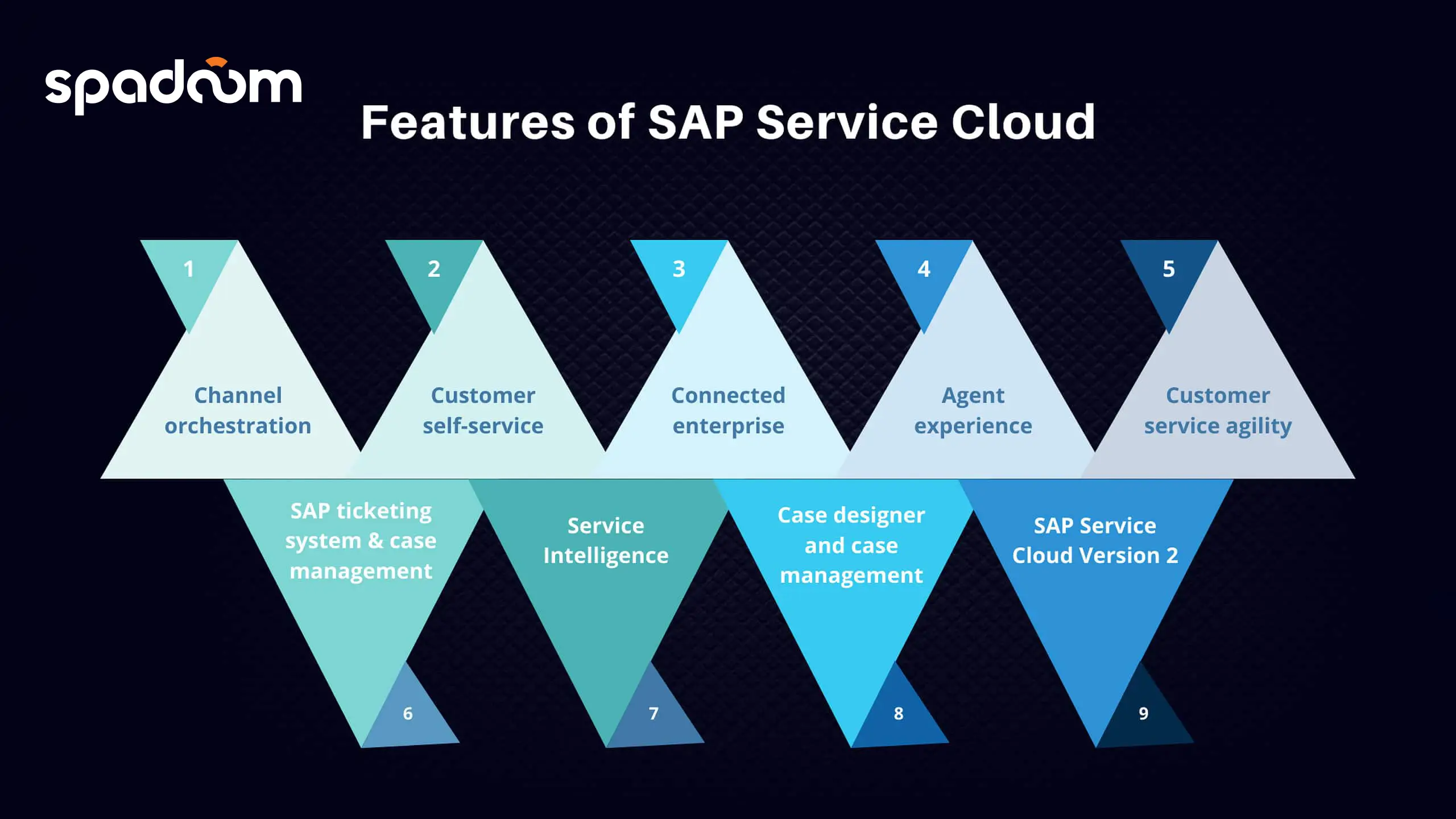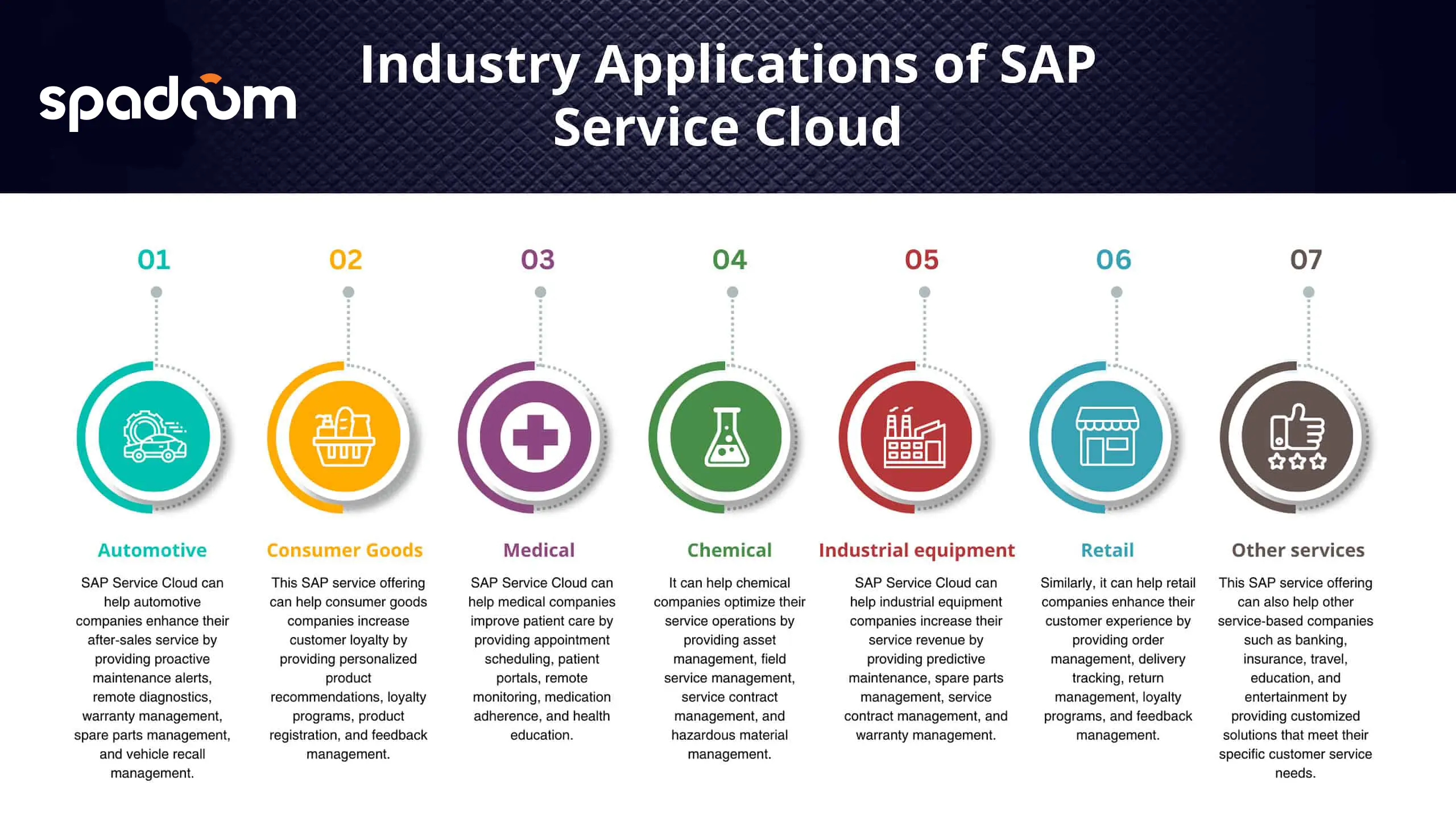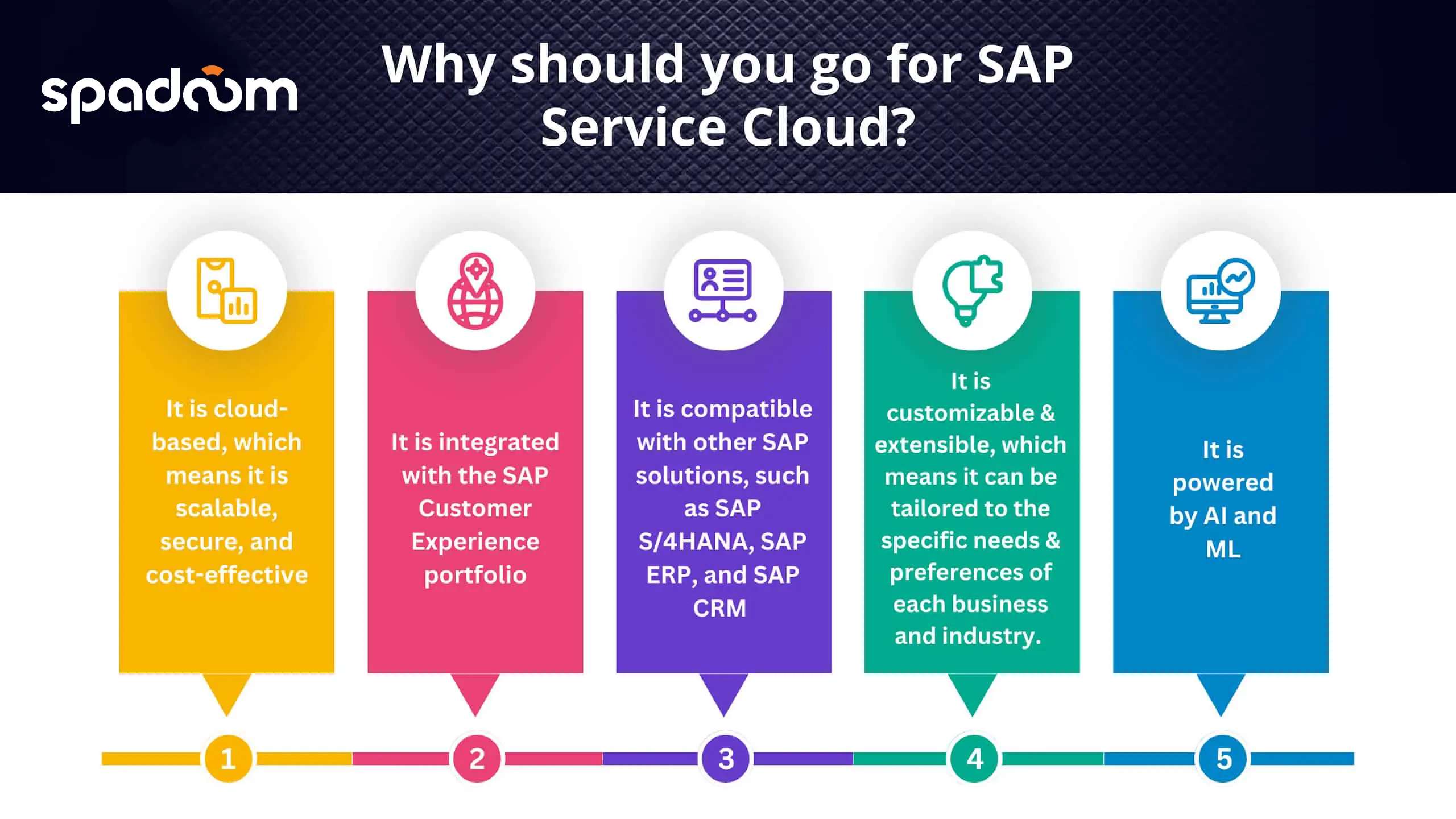The Power Of SAP Service Cloud: Key Features and How To Leverage Them
- September 14, 2023
Customer service is a key differentiator for businesses in today’s competitive and dynamic market. Customers expect fast, reliable, and personalized service across all channels, and they are willing to switch to competitors if their expectations are not met. In fact, 80% of customers say the experience a company provides is as important as its products or services.
To meet these customer expectations, businesses need to adopt a customer-centric approach that connects business-wide service operations, delivers consistent and seamless service experiences, and drives customer satisfaction and loyalty. This is where SAP Service Cloud comes in. So, let’s get started with this comprehensive Service Cloud overview and find how you can make the most of its powerful features.
What is SAP Service Cloud and how did it evolve?
SAP Service Cloud is a cloud-based customer service solution that enables businesses to provide fast, reliable, and personalized service across all channels. SAP Service Cloud has originated from the evolution of SAP CRM, which was an on-premise CRM solution released in 2000.
SAP acquired Hybris in 2013 to upgrade its CRM’s abilities, forming SAP Hybris. SAP continued to enhance and expand the solution with new acquisitions and feature development. In 2018, the SAP Hybris solution was renamed SAP Customer Experience. Moreover, the SAP Hybris Service Cloud, which was a part of SAP Hybris, was renamed SAP Service Cloud.
As a result, SAP Service Cloud is now a part of the SAP Customer Experience (SAP CX) portfolio, which also includes SAP Marketing Cloud, SAP Sales Cloud, SAP Commerce Cloud, and SAP Customer Data Cloud.
Notably, SAP CX comes under the overall SAP CRM Cloud or SAP Cloud for Customer initiative of SAP. Some of its leading clients include PepsiCo, Lufthansa, Swisscom, and Siemens.
Features of SAP Service Cloud
SAP Service Cloud offers a comprehensive set of features that help businesses improve their customer service performance and outcomes. Some of the key features are:
- Channel orchestration– SAP Service Cloud enables service agents to manage customer interactions from various channels, such as phone, email, chat, social media, web forms, and self-service portals. This allows them to provide fast, reliable, and personalized service across all touchpoints. With channel orchestration, service agents can easily switch between channels, access customer history and context, and collaborate with other agents or experts. Channel orchestration also helps businesses optimize their channel mix and reduce costs by directing customers to the most appropriate and effective channel for their needs.
- Customer self-service– SAP Service Cloud empowers SAP cloud customers to access knowledge articles, FAQs, chatbots, and community forums to find answers to their questions and resolve issues on their own. This reduces the need for contacting service agents and improves customer satisfaction and loyalty. Customer self-service also helps businesses save time and resources by reducing the volume of service requests and increasing the efficiency of service teams. Customer self-service can be integrated with SAP Commerce Cloud to provide a seamless shopping and service experience.
- Connected enterprise– SAP Service Cloud connects business-wide service operations by breaking down system silos and activating the entire enterprise. This means that service teams can access and share data and processes from other SAP solutions, such as SAP S/4HANA, SAP ERP, SAP Marketing Cloud, SAP Sales Cloud, and SAP Customer Data Cloud. This helps them to speed up issue resolution and deliver on their brand promise. Connected enterprise also helps businesses to improve their service quality and consistency by aligning their service strategy with their business strategy.
- Agent experience– SAP Service Cloud enhances the agent experience by providing fast access to the right information and insights. Service agents can use the agent desktop to view a single view of the customer that provides relevant information such as contact details, interaction history, preferences, feedback, and sentiment. Service agents can also use service intelligence to get solution recommendations, sentiment analysis, predictive analytics, and intelligent insights that help them improve customer engagement and first-contact resolution. Agent experience also helps businesses to increase agent productivity and retention by reducing agent effort and frustration.
- Customer service agility– SAP Service Cloud enables customer service agility by allowing businesses to stay agile in changing situations. Service teams can quickly adjust their customer service when needed by using the case designer and case management functions. These functions allow them to design and manage complex service processes with graphical tools, templates, rules, and workflows. Service teams can also use the ticket and case management functions to automate ticket categorization, routing, prioritization, escalation, and collaboration. Customer service agility also helps businesses adapt to customer expectations and market trends by enabling continuous improvement and innovation.
- SAP ticketing system and case management– SAP Service Cloud helps service teams efficiently solve customer tickets by using the SAP ticketing system and case management functions. These functions allow service teams to automate ticket categorization, routing, prioritization, escalation, and collaboration. Service teams can also use the ticket inbox to view and manage all tickets from one place. Ticket and case management also helps businesses improve their service performance and outcomes by enabling faster resolution times, higher resolution rates, lower costs per ticket, and higher customer satisfaction.
- Service Intelligence– SAP Service Cloud leverages artificial intelligence (AI) and machine learning (ML) to support service teams with solution recommendations, sentiment analysis, predictive analytics, and intelligent insights. Service intelligence helps service teams to provide better, faster service responses and outcomes by enhancing their decision-making, problem-solving, and customer understanding. Service intelligence also helps businesses to optimize their service operations and strategy by providing actionable insights and recommendations.
- Case designer and case management– SAP Service Cloud allows service teams to design and manage complex service processes with graphical tools, templates, rules, and workflows. Case design and case management help service teams handle various types of service scenarios, such as complaints, returns, repairs, installations, inspections, and audits. Case design and case management also help businesses to standardize and automate their service processes and ensure compliance with regulations and policies.
- SAP Service Cloud Version 2– SAP Service Cloud Version 2 is a utilities add-on that enhances cloud customer service processes with an end-to-end solution tailored to the utility industry. SAP Service Cloud Version 2 helps utility companies provide proactive and personalized service to SAP Cloud customers by enabling smart metering, billing, consumption analysis, outage management, demand response, and energy efficiency. SAP Service Cloud Version 2 also helps utility companies improve their operational efficiency and profitability by reducing costs, increasing revenue, and enhancing customer loyalty.
Industry Applications of SAP Service Cloud
SAP Service Cloud can be applied to various industries that need to provide exceptional cloud customer service. Some examples are:
- Automotive- SAP Service Cloud can help automotive companies enhance their after-sales service by providing proactive maintenance alerts, remote diagnostics, warranty management, spare parts management, and vehicle recall management.
- Consumer goods- This SAP service offering can help consumer goods companies increase customer loyalty by providing personalized product recommendations, loyalty programs, product registration, and feedback management.
- Medical- SAP Service Cloud can help medical companies improve patient care by providing appointment scheduling, patient portals, remote monitoring, medication adherence, and health education.
- Chemical- It can help chemical companies optimize their service operations by providing asset management, field service management, service contract management, and hazardous material management.
- Industrial equipment- SAP Service Cloud can help industrial equipment companies increase their service revenue by providing predictive maintenance, spare parts management, service contract management, and warranty management.
- Retail- Similarly, it can help retail companies enhance their customer experience by providing order management, delivery tracking, return management, loyalty programs, and feedback management.
- Other services- This SAP service offering can also help other service-based companies such as banking, insurance, travel, education, and entertainment by providing customized solutions that meet their specific customer service needs.
Why should you go for SAP Service Cloud?
SAP Service Cloud is a powerful and flexible solution that can help businesses of any size and industry to provide exceptional customer service. Some of the benefits and USPs of SAP Service Cloud are:
- It is cloud-based, which means it is scalable, secure, and cost-effective
SAP Service Cloud is a cloud-based solution that runs on the SAP Cloud Platform, which is a reliable and secure platform that provides high availability, performance, and scalability. By using SAP Service Cloud, businesses can benefit from the advantages of cloud computing, such as lower upfront costs, faster deployment, easier maintenance, and greater flexibility. Businesses can also choose from different deployment options, such as public cloud, private cloud, or hybrid cloud, depending on their needs and preferences.
- It is integrated with the SAP Customer Experience portfolio
As mentioned, SAP Service Cloud is part of the SAP Customer Experience portfolio and SAP Cloud for Customers, which is a suite of SAP cloud solutions that covers the entire customer journey from marketing to sales to service to loyalty. With SAP Service Cloud, businesses can leverage the data and capabilities of other solutions in the portfolio, such as:
– SAP Marketing Cloud- A solution that helps businesses to understand their customers better and deliver personalized and relevant marketing campaigns across channels.
– SAP Sales Cloud- A solution that helps businesses manage their sales pipeline and close more deals faster and smarter.
– SAP Commerce Cloud- A solution that helps businesses create engaging and seamless shopping experiences across channels and devices.
– SAP Customer Data Cloud- A solution that helps businesses collect and manage customer data in a secure and compliant way.
By integrating these solutions with SAP Service Cloud, businesses can create a 360-degree view of their customers and provide consistent and seamless service experiences across touchpoints.
- It is compatible with other SAP solutions, such as SAP S/4HANA, SAP ERP, and SAP CRM
This compatibility means it can connect to the core business processes and systems of the enterprise that are widely used by businesses to run their core business processes and systems, such as:
– SAP S/4HANA- A next-generation ERP solution that provides real-time insights and intelligence for business decision-making.
– SAP ERP- A classic ERP solution that integrates key business functions such as finance, accounting, human resources, procurement, production, and logistics.
– SAP CRM- A legacy CRM solution that supports customer relationship management processes such as marketing, sales, service, and analytics.
By connecting these solutions with SAP Service Cloud, businesses can ensure that their service operations are aligned with their business operations and that their service data is synchronized with their business data. This helps them to improve their service efficiency and effectiveness.
- It is customizable and extensible, which means it can be tailored to the specific needs and preferences of each business and industry.
SAP Service Cloud is a customizable and extensible solution that can be tailored to the specific needs and preferences of each business and industry. Businesses can use the following tools and methods to customize and extend SAP Service Cloud:
– Configuration- Businesses can use the configuration tools in the SAP Service Cloud Administration Console to adjust the settings and parameters of the solution according to their requirements.
– Customization- Businesses can use the customization tools in the SAP Service Cloud Studio to modify the user interface and functionality of the solution according to their preferences.
– Extension- Businesses can use the extension tools in the SAP Cloud Platform Extension Factory to add new features and functionalities to the solution according to their needs.
Customizing and extending SAP Service Cloud will help businesses create a unique and differentiated service solution that meets their specific customer service challenges and opportunities.
- It is powered by AI and ML
This means it can provide intelligent and automated support for service teams and customers. SAP Service Cloud is powered by artificial intelligence (AI) and machine learning (ML), which are SAP cloud service technologies that enable machines to learn from data and perform tasks that normally require human intelligence. By using AI and ML, SAP Service Cloud can provide intelligent and automated support for service teams and customers, such as:
– Intelligent insights- SAP Service Cloud can provide intelligent insights that help service teams understand the root causes of customer issues and the impact of service actions, helping improve customer experience.
– Solution recommendations- It can also suggest the best SAP cloud solutions for customer issues based on historical data and knowledge base articles.
– Sentiment analysis- SAP Service Cloud can analyze the emotions of customers based on their text or voice inputs and adjust the tone and style of service responses accordingly.
– Predictive analytics- It can predict future customer behavior and outcomes based on historical data and trends. Predictive analytics helps service teams to anticipate customer needs and expectations and provide proactive and preventive service.
If you are wondering about the cost, SAP Service Cloud offers three pricing options. Here are the options for service cloud pricing-
- Professional Edition (starting from $75 per user per month)
- Enterprise Edition (starting from $125 per user per month)
- Ultimate Edition (starting from $200 per user per month)
The exact pricing of SAP cloud services depends on the number of users and the features included in each edition.
How a SAP CX implementation agency can help to leverage SAP Service Cloud
Implementing SAP Service Cloud can be a complex and challenging task that requires expertise and experience. A seasoned SAP CX implementation agency like Spadoom can help businesses leverage SAP Service Cloud by providing the following services:
- Consulting- A SAP CX implementation agency can help businesses define their customer service strategy, goals, and requirements, and design a solution that fits their needs and budget.
- Implementation- A SAP CX implementation agency can help businesses install, configure, integrate, and test SAP Service Cloud with their existing systems and processes.
- Training- A SAP CX implementation agency can help businesses train their service teams and customers on how to use SAP Service Cloud effectively and efficiently.
- Support- A SAP CX implementation agency can help businesses maintain, update, and troubleshoot SAP Service Cloud as well as provide ongoing guidance and best practices.
Summing Up
SAP Service Cloud is a cloud-based customer service solution that enables businesses to provide fast, reliable, and personalized service across all channels. It is part of the SAP Customer Experience portfolio and SAP Cloud for Customers that connect business-wide service operations. It also offers a comprehensive set of features that help businesses improve their customer service performance and outcomes.
SAP Service Cloud can be applied to various industries that need to provide exceptional customer service. It has many benefits and USPs over its competitors. Moreover, you can leverage the true power of SAP Service Cloud by hiring an SAP CX implementation agency that can provide consulting, implementation, training, and support services.
FAQs
Here are some frequently asked questions about SAP Service Cloud to help you get a clearer idea of the tool:
- How does SAP Service Cloud integrate with other solutions?
SAP Service Cloud integrates with other solutions in the SAP CX portfolio and other SAP solutions. You can use the SAP Cloud Platform Integration service to enable secure data exchange; and use the SAP Cloud Platform Extension Factory service to extend and customize SAP Service Cloud features.
- How can I migrate from SAP CRM to SAP Service Cloud?
If you are using SAP CRM on-premise and want to move to SAP Service Cloud, you can use the SAP S/4HANA Migration Cockpit to transfer your data and configuration. You can also use the SAP Cloud ALM tool to manage your migration project and monitor your progress.
- How can I get support for SAP Service Cloud?
To get support, you can use the SAP ONE Support Launchpad to access various resources and services, such as Knowledge Base Articles, Expert Chat, Schedule an Expert, and Report an Incident. You can also refer to the SAP Support Portal or contact them on the SAP customer service number.
- What are the system requirements for SAP Service Cloud?
The system requirements for SAP Service Cloud are a web browser that supports HTML5 and JavaScript, such as Google Chrome, Mozilla Firefox, Microsoft Edge, or Apple Safari, and an internet connection with a minimum bandwidth of 1 Mbps. Refer to the SAP Service Cloud Technical Information for more details.







